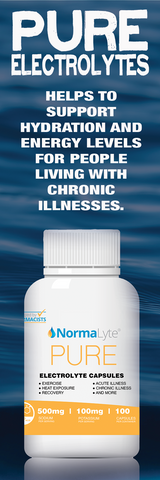Understanding POTS: How Salt Helps


So, you have POTS. Now what?
You suspected you had POTS, or Postural Orthostatic Tachycardia Syndrome, for some time, but you finally got the diagnosis needed and now you can finally start to manage your symptoms. Welcome to the club that no one ever wanted to join. Membership is mandatory along with maintaining your salt levels. Don't carry salts in your bag yet? Just wait. You will.
INCREASED SODIUM
It's possible your doctor gave you some advice regarding treating POTS. The advice usually varies. Some insist that exercise is key, others say that compression socks (or even compression leggings) is essential, and many more say that it's a combination of things that will help including increasing your sodium intake.
You doctor might have actually said something like, "eat more salt" instead of telling you to increase sodium. Please keep in mind that salt and sodium are not the same thing.
SALT VS SODIUM
Take a quick detour with me. This is a common question we get from people.
All salt has sodium in it, but sodium is not salt. Sodium on its own is a mineral.
Salt is the combined mineral makeup of both sodium and chloride.
Keep this in mind when you're looking at salt vs sodium. If your doctor said to get 10 grams of salt, that's equivalent to 4,000mg of sodium. Some doctors suggest up to 25 grams of salt (10,000mg of sodium) for POTS. Not sure what your doctor recommended? It's likely they gave you an idea, and we suggest you reach out to them to get a good answer as everyone's medical conditions vary greatly.
We have a calculator that could be helpful for you to ensure you're getting the amount of salt or sodium you need.
SALTY OPTIONS
You have options when it comes to the salt you take. Let's look at some ways to increase your salt intake.
- Salty Snacks. Consuming more salt is one way that people with dysautonomia often get their intake in. Things like pickles, pretzels, and more will help you reach your salt goals.
- Salt Your Food. Grab the salt shaker and go to town! No, really. You have a free pass to add salt to everything you eat.
- Drink and Oral Rehydration Salt (ORS). Oral rehydration salts are drink mixes added to water. Using the World Health Organization's formula, you will find that these drinks will not only get salt and water into your system quickly, but effectively too. NormaLyte's Oral Rehydration Sticks use a 1:1 sodium to glucose combination that allows you to absorb water and sodium in your body in the most efficient way. These are perfect for feeling better faster.
- Salt Capsules. Sometimes you may be doing everything right, but it's still so very hard to get in the amount of salt you need. Salt capsules are the perfect way to get more sodium in one swift swallow. NormaLyte's PURE Electrolyte Capsules have 500mg of sodium per serving, and can be taken as often as needed per doctors recommendations.
DOES SALT HELP POTS?
This is a great question.
Right now, it's the most recommended way to increase blood volume in patients with POTS. In increasing blood volume, you decrease the occurrence of symptoms. A study released at the end of 2020 shows that a high salt diet will help increase blood volume, keeps your standing blood volume higher, and even decreases heart rate.
See the chart from the study below.
The study went on to discuss how children with POTS found symptom management following "supplementation with sodium chloride capsules" and water through IV therapy.
We think it's safe to say that salt can help POTS patients feel better.
DO YOU HAVE DYSAUTONOMIA?
Just know that you're not alone. There are options for maintaining your salt balance to keep your blood volume up. Talk to your doctor and find a plan that works for you.










Leave a comment